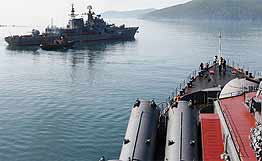
MOSCOW, September 8 (RIA Novosti) – A Russian naval task force from the Northern Fleet will go on a tour of duty in the Atlantic Ocean and participate in joint naval drills with the Venezuelan navy in November, a Navy spokesman said on Monday. (Russian Navy modernized – Image gallery)
“In line with the 2008 training program and in order to expand military cooperation with foreign navies Russia will send in November a naval task force from the Northern Fleet, comprising nuclear-powered missile cruiser Pyotr Velikiy and support ships, to the Atlantic Ocean,” Capt. 1st Rank Igor Dygalo said.
During the tour of duty, the Russian warships will participate in joint naval exercises with the Venezuelan navy.
Related article: Russia to send naval squadron, planes to Venezuela
Read moreRussia confirms sending warships to the Atlantic, Caribbean